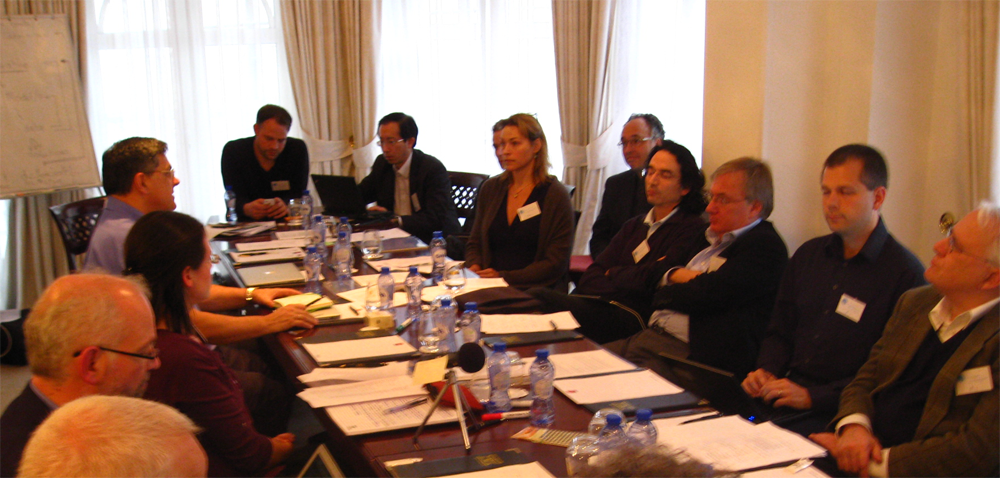CIMPLEX
Complex is an EC funded project. This is an acronym with the full title of the project given by “Bringing Citizens, Models and Data together in Participatory, Interactive SociaL EXploratories”
The proposes visionary research to develop modelling, computational, and ICT tools needed to predict and influence disease spread and other contagion phenomena in complex social systems. To achieve non-incremental advances it will combine large scale, realistic, data-driven models with participatory data-collection and advanced methods for Big Data analysis. In particular it will go beyond the one-dimensional focus of current approaches tackling one aspect of the problem at a time. Cimplex will interconnect contagion progression (e.g. epidemics) with social adaptation, the economic impact and other systemic aspects that will finally allow a complete analysis of the inherent systemic risk. As a tangible ICT outcome directed at facilitating the uptake and impact of the project, Cimplex will implement “Interactive Social Exploratories” defined as interactive environments which act as a front-end to a set of parameterizable and adjustable models, data analysis techniques, visualization methods and data collection frameworks.
For more information please visit the Cimplex website here.
Other Projects
At UCL I am involved with a number of centres, mainly:
- Planning has started to create a Decision Arena at UCL to bring data, models and people together in a space that will enhance our ability to make critical decisions, particularly in a time of crisis. Since the time scales for such things as climate change and major flooding are vastly different, the Decision Arena will require access to multi-scale models of complex systems with different representations of agents at different scales. There is a need to develop methods to incorporate real-time data and other information and so there is plenty of research still to do.
- I am on the Executive Board of the UCL Institute of Risk and Disaster Reduction which aims to bring together expertise within UCL and elsewhere to carry out research how we can understand and reduce the risk of natural, environmental, health and technical challenges.
- I supervise Toby Davies in his PhD studies as part of the UCL Centre for Security and Crime Science. This centre – called SECReT is the £17m international Security Science Doctoral Research Training Centre for PhD funded by the UK EPSRC and is the first centre of its kind in Europe. The Centre offers a comprehensive integrated PhD programme for students wishing to pursue multidisciplinary security or crime-related research degrees. Toby Davies’s work looks into models of crime patterns, notably burglary. Toby is also part of the Security workstream in the ENFOLDing project.
- I am a member of the Steering Group of the UCL Centre for Forensic Sciences mainly in an advisory role. The centre’s mission is to contribute significantly to the development of the forensic sciences through high quality multidisciplinary research, teaching & learning, and through the establishment of collaborative projects with external partners.
- I supervise Christopher Wray in his PhD studies as part of the UCL Doctoral Training Centre in Financial Computing. The UK PhD Centre in Financial Computing was established at University College London (UCL) in collaboration with academic partners the London School of Economics (LSE) and the London Business School (LBS) in 2007, supported by partnerships with twenty leading financial institutions. It is the first major collaboration between the financial services industry and academia.
Previous Projects
Big Data
Decision-making is the essence of management. Mammoth amounts of data are being generated through society’s interactions with technology, documenting stages of collective human decision making on a scale previously impossible to achieve. Such digital traces of individuals create new scientific and commercial opportunities in the digital economy. The goal of this project is to explore the possibility to make use of massive new data sources capturing online information streams that can provide insight into large-scale trends and decision-making.
For more information please click here
ENFOLDing
I am a Co-Investigator on a project funded by the UK EPSRC called ENFOLDing. This brings together researchers from the fields of Political Science, Economics, Mathematics, Physics, Urban Planning, Security Science, Geography and Transport Research to model and understand global-level dynamics. There is a larger team involved with the project but I directly supervise Thomas Oléron Evans whose work involves creating and analysing mathematical models of complex dynamical systems. His research interests include agent based epidemiological models and the introduction of spatial structure to security games. Until recently Hannah Fry was a research assistant on this grant but she has now been given a lectureship at UCL and so a current vacancy exists.
For more information please visit the ENFOLDing website
Dream Fellowship
I am the holder of a prestigious Dream Fellowship funded by the UK EPSRC which allows me to devote all of my time to consider novel creative problem solving techniques, explore new radical ideas and develop new ambitious research directions that enable discovery. The thrust of my ‘dreaming’ is to find new ways to use art and narrative to help decision makers understand the interconnected networks that form our complex world.
Part of the Dream Fellowship allows me to indulge in my interest in the relationship between art and science with technology often playing a critical, underpinning role in between the two. This work has been growing from initial thoughts and included a year where I had an artist join me on a grant funded by the Wellcome Trust. Naheed Raza spent a year exploring twisted string and other objects and their connections to, or analogies with, similar features in nature including blood vessels in the brain. I would be keen to promote more activity – so do get in touch.
GSDP

I am a Partner in the European FP7 funded project Global System Dynamics & Policy – GSDP – which is a coordination and support action to develop a research program for the study of global systems in an ongoing dialogue with decision makers. GSDP operates as an open network evolving through workshops, working papers, publications, and conferences to consolidate an international community of researchers engaged in dialogues with decision-makers, and generate a variety of research and consultancy projects in Europe and elsewhere. Peter Baudains is a research assistant on the GSDP.
For more information please visit the GSDP website
FuturICT
From May 2011 until May 2012 I was the coordinator of the FET Flagship Pilot project, FuturICT. This European FP7 project was a coordination and support action project to bring together the communities of information and communication technologies (ICT), social science and complexity science to develop a 10-year programme of research to better understand the interaction between our technical, environmental and socio-economic systems. A full proposal was submitted to the European Commission on Oct 23rd 2012 with the result expected early in 2013.
For more information please visit the FuturICT website
GSD

From May 2008 to July 2010 I co-ordinated an European funded Coordination Action called GSD whose task was to review how complex systems analysis can be applied to policy decisions. GSD, or Global System Dynamics and Policies, was a project funded by the Future & Emerging Technologies division of the European Commission made up of 11 Partner institutes from across Europe. The project had a particular focus on climate change, sustainable cities, risk, energy and social problems. The programme connected the building of different methodologies of multi-physics modelling, engineering systems, dynamics, economics and organisations modelling and lead to the funding of a further project GSDP.
For more information please visit the GSD website
These, and other grants that I have been involved in have brought resulted in approximately £7.7million funding since 2005. Prior to 2005 grants in the engineering domain were as successful in terms of funding researchers if measured on equivalent rates as today.


